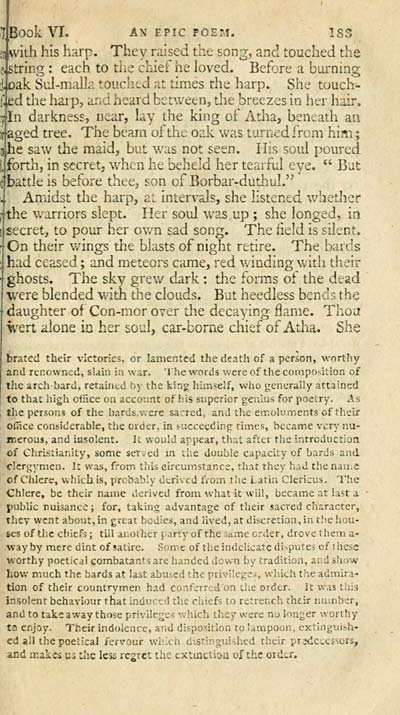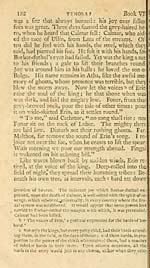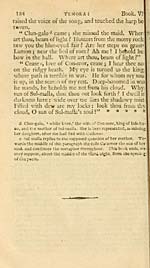Download files
Complete book:
Individual page:
Thumbnail gallery: Grid view | List view

,7,BO0kVI. AN EPIC POEM. ISS
ei wiih his harp. They raised the song, and touched the
e, string : each to the chiet he loved. Before a burning
i oak Sd-malla touclied at times the harp. She touch-
[, ed tlie harp, and heard between, tlie breezes in her hair.
7 In darkness, near, lay the king of Atha, beneath an
)r aged tree. The beam of the oak was turned from him ;
he saw the maid, but was not seen. His soul poured
forth, in secret, when he beheld her tearful eye. " But
battle is before thee, son of Borbar-duthul." '
Amidst the hai-p, al intervals, she listened v/!iether
the v/arriors slept. Her soul was up ; she longed, in
secret, to pour her own sad song. The field is silent.
On their wings the blasts of night retire. The bards
had ceased ; and meteors came, red v, inding with their
ghosts. The sky grew dark : the forms of the dead
were blended with the clouds. But heedless bends the
daughter of Con-mor over the decaying flame. Thou
wert alone in her soul, car-borne chief of Atha. She
brated their victories, or lamented the death of a person, worthy
and renowned, slahi in war. The words were of the composition of
tlie archbard, retained by the king himself, who generally attained
to that high cilice on account of h.is superior genius for poetry. As
the persons of the bards.were sarred, and the etr.oluments of their
office considerable, the order, in bucceeding rimes, became very nu-
merous, and insolent. It would appear, that after the introduction
of Christianity, some ser.ed m the double capacity of bards and
clergymen. It was, from this circumstance, that they had the nau.e
of Chlere, which is, probably derived fiom the Latin Clericus. The
Chlere, be their name derived from what it will, became at last a
public nuisance ; for, taking advantage of their sacred character,
they went about, in great bodies, and lived, at discretion, in the hou-
ses of the chiefs ; till another j arty of the ^ame order, drove them a-
wayby mere dint of satire. !>omc of the indelicate disputes of these
worthy poetical combatants are handed down by tradition, and show
how much the bards at last abused the privileges, which the admira-
tion of their countrymen had conferred'on the order. It was this
insolent behaviour that induced the chiefs to retrench their number,
and to take away those privileges which they were no longer worthy
to enjoy. Tneir indolence, and disposition to lampoon, extinguish-
ed all the poetical fervour which distinguished their prsdcctssors,
and :r.akcs u j the less regret the txtixictioa of the ord,.r.
ei wiih his harp. They raised the song, and touched the
e, string : each to the chiet he loved. Before a burning
i oak Sd-malla touclied at times the harp. She touch-
[, ed tlie harp, and heard between, tlie breezes in her hair.
7 In darkness, near, lay the king of Atha, beneath an
)r aged tree. The beam of the oak was turned from him ;
he saw the maid, but was not seen. His soul poured
forth, in secret, when he beheld her tearful eye. " But
battle is before thee, son of Borbar-duthul." '
Amidst the hai-p, al intervals, she listened v/!iether
the v/arriors slept. Her soul was up ; she longed, in
secret, to pour her own sad song. The field is silent.
On their wings the blasts of night retire. The bards
had ceased ; and meteors came, red v, inding with their
ghosts. The sky grew dark : the forms of the dead
were blended with the clouds. But heedless bends the
daughter of Con-mor over the decaying flame. Thou
wert alone in her soul, car-borne chief of Atha. She
brated their victories, or lamented the death of a person, worthy
and renowned, slahi in war. The words were of the composition of
tlie archbard, retained by the king himself, who generally attained
to that high cilice on account of h.is superior genius for poetry. As
the persons of the bards.were sarred, and the etr.oluments of their
office considerable, the order, in bucceeding rimes, became very nu-
merous, and insolent. It would appear, that after the introduction
of Christianity, some ser.ed m the double capacity of bards and
clergymen. It was, from this circumstance, that they had the nau.e
of Chlere, which is, probably derived fiom the Latin Clericus. The
Chlere, be their name derived from what it will, became at last a
public nuisance ; for, taking advantage of their sacred character,
they went about, in great bodies, and lived, at discretion, in the hou-
ses of the chiefs ; till another j arty of the ^ame order, drove them a-
wayby mere dint of satire. !>omc of the indelicate disputes of these
worthy poetical combatants are handed down by tradition, and show
how much the bards at last abused the privileges, which the admira-
tion of their countrymen had conferred'on the order. It was this
insolent behaviour that induced the chiefs to retrench their number,
and to take away those privileges which they were no longer worthy
to enjoy. Tneir indolence, and disposition to lampoon, extinguish-
ed all the poetical fervour which distinguished their prsdcctssors,
and :r.akcs u j the less regret the txtixictioa of the ord,.r.
Set display mode to: Large image | Transcription
Images and transcriptions on this page, including medium image downloads, may be used under the Creative Commons Attribution 4.0 International Licence unless otherwise stated. ![]()
| Early Gaelic Book Collections > Ossian Collection > Poems of Ossian, the son of Fingal > Volume 2 > (193) |
|---|
| Permanent URL | https://digital.nls.uk/77915028 |
|---|
| Shelfmark | Oss.54 |
|---|---|
| Attribution and copyright: |
|
| Description | Selected books from the Ossian Collection of 327 volumes, originally assembled by J. Norman Methven of Perth. Different editions and translations of James MacPherson's epic poem 'Ossian', some with a map of the 'Kingdom of Connor'. Also secondary material relating to Ossianic poetry and the Ossian controversy. |
|---|
| Description | Selected items from five 'Special and Named Printed Collections'. Includes books in Gaelic and other Celtic languages, works about the Gaels, their languages, literature, culture and history. |
|---|

